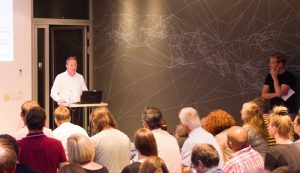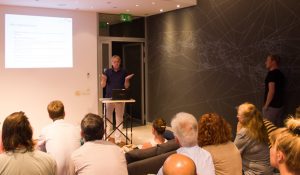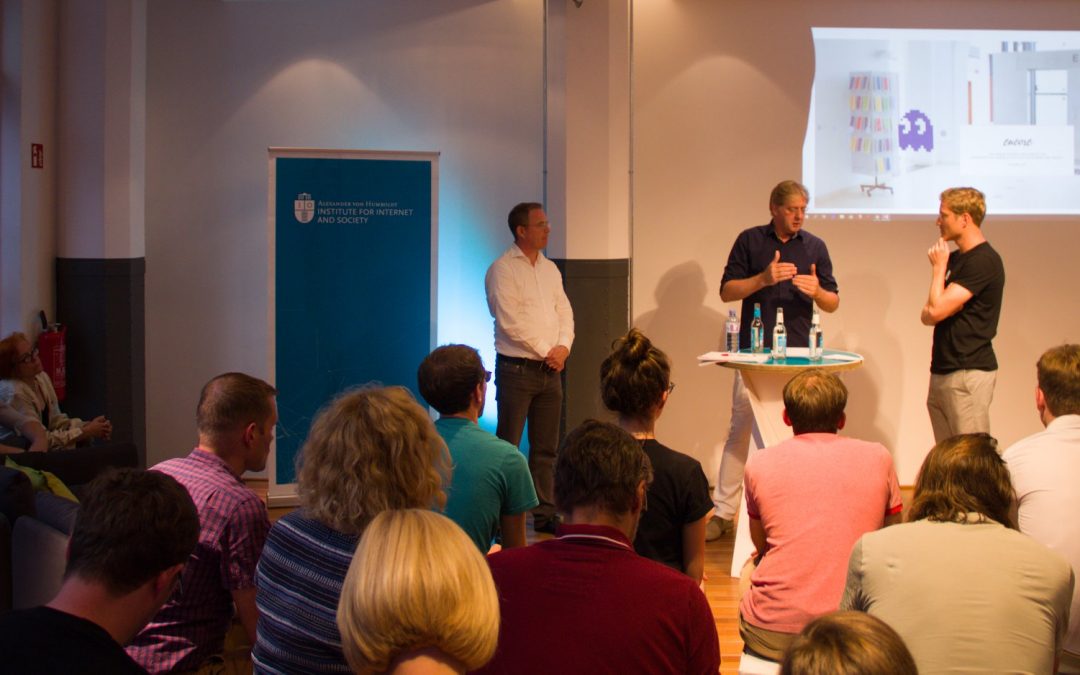Nick Fowler and Gerard Meijer on the future of Open Access in Germany. Will the negotiations continue?
German universities and research institutions are playing a prominent role in the global trend of shifting academic publishing to open access. A nationwide consortium of scientific institutions, known as DEAL, aims to encourage academic publishers to adopt new licensing agreements for open access publication of scholarly content. According to the proposed “Publish and Read“ model, an annual lump sum would be paid to publishers, in order to cover the article processing charges (APCs) of all papers written by German scholars and make all publications offered by this publisher available to scholars associated with a DEAL institution. Previously, every institution had to buy individual subscriptions to specific journals. Despite these ambitious plans, in July 2018 the negotiations with Elsevier, the biggest academic publisher, and provider of science and health information analytics were suspended.
What are the next steps? How far will Elsevier and the DEAL consortium go to reach a compromise? Elephant in the Lab talked to high ranked representatives on both sides of these negotiations: Dr. Nick Fowler – Chief Academic Officer and Managing Director Research Networks at Elsevier and Prof. Dr. Gerard Meijer – Director and Scientific Member at the Fritz Haber Institute of the Max Planck Society (Berlin).
Why did the DEAL-negotiations fail?
Meijer: We agreed on the general numbers, like how many articles are actually published per year in Germany, but we did not agree upon the price it would cost to get all these articles published and which would enable users to read all the other content that is accessible through subscription fees. We also managed to agree on the cost for an Open Access publication (APCs), but we did not manage to agree on a total package.
Fowler: Yes, that is true. We agreed on the number of articles published by Elsevier by the corresponding German author, which is 16,500 articles. In our opinion, 2,000 euros as an article publishing charge is a good number to use on average in this context; and therefore we agreed that the annual cost of gold open access would be around 16,500 multiplied by 2000, which equals 33 million euros. Currently, more institutions in Germany want to be able to read the full content of Elsevier from around the world and that would amount to 33 million euros in addition to what was previously being paid to read via subscriptions.
What would the perfect outcome for both sides be?
Meijer: A compromise, of course. We have the feeling that Elsevier didn’t go far enough and this is why we did not reach an agreement. We should also agree on the timescale within which our agreement should be implemented. We want the switch to Open Access to happen faster, and really lower the cost from about 50 million euros (overall fees paid by German institutions) to 33 million euros.
Fowler: We absolutely want to help Germany to achieve its Open Access ambitions. We’re on one side concerning this. However, there are several challenges -; for instance the fact that a large portion of the world’s articles is published under the subscription model. Then the question arises: how do you provide access to publications, while the rest of the world is not following the example of Germany? The outcome requires a compromise that we would love to achieve sooner, not later. We both want to reach a deal.
We are ready to make a number of concessions: we’d consider a reduction in subscription prices, we’ve offered that. We would consider a reduction in article publishing charges and we’ve offered that as well. We would also consider deeply reduced article publication charges in some of our newer formats, such as our open access mega-journals like Heliyon. We should also consider enabling green open access at scale. German repositories could receive access to the publications after a certain embargo period. That would, of course, be an interim thing while gold open access builds around the world and there is less need for that. Also, the volume of gold open access grows, the proportion of subscription articles will become smaller although currently, total volume of articles under both models is continuing to grow. What we need is a well-defined transition period, where you get to the end type that Germany is ordering – 33 million euros; it will get that, but we really struggle to see how it can happen in one step.
Is there a need for a market for scholarly publications? And what role does the researcher play in it?

Dr. Nick Fowler
Meijer: The researcher is the person supplying the product to the market, does the quality control and then buys it back. That is how the situation is right now. In the end, we all have to realize that a publication is an essential part of a research project and the publisher or a publishing agency is needed to cooperate in that part of the work – to get it published and to disseminate it around the world. And this role of publishers remains also in the future. That is why we need each other; this is why we work so hard to find an agreement even if the standpoints are a bit apart.
Fowler: In our case, we won’t have a future if we don’t stay relevant to the researchers or if we are perceived as operating unfairly. In this market, we are a service provider, we offer something that is valued by the community; if we are not able to do so anymore, we would cease to exist. So, it’s absolutely our duty to remain in line with the needs of the research community. There are multiple stakeholders in the community – governments, fundraisers, university leaders, librarians, researchers, publishers. There is a request to enable Open Access and we recognize that and we try to come to an agreement in a way that can still work for the long term.
Does it have to be a commercial market?
Meijer: It certainly doesn’t have to be in the commercial sphere, but in the end universities and research institutions are interested in receiving this service. Of course, universities could organize, for example, their conferences themselves, but there are organizations to do this for them because they are specialized in this and do it better. It’s the same in publishing: there are publishers who specialize in the publishing business and do it better, more efficiently. It’s their job and so you should respect the specific expertise that different parties bring in. In that sense I think it is very good to have a market, to have a commercial partner that takes these tasks upon them, but it only works if from both sides you agree on the conditions that are funding that.
And, of course, a commercial publisher is there to make a profit; we want them to, that is perfectly fine. Nobody is interested in publishers that go bankrupt, they should have a sustainable business. But the model has to be sustainable for both sides. You have to realize that the publication business – the subscription model – is no longer sustainable to many universities. Germany is a rich country, many universities can pay for this, in many other countries, also major universities can no longer afford the increasing subscription prices. Something needs to change. That’s how I see it.
Fowler: I agree, in theory, you don’t need the services that are provided by the publishing sector to be provided commercially. Historically, universities used to do things themselves, but then they started outsourcing to publishers. The point is that universities want to do research and they want to minimize the amount of administration that they have to do. We find that the services should be done at a certain scale and it’s easier to attract companies to do them: they tend to be more efficient. If you didn’t have commercial suppliers, you’d be trying to do these things yourself in the academic sector, and this would cause tension within academic institutions. They’d be reinventing the wheel a lot of times, for example, the software, secure its interoperability etc.
Can online platforms and digital tools provide an alternative for the existing business models?
Meijer: We do look at alternatives and support various Open Access initiatives. It’s true, researchers secure quality control by themselves, but somebody still needs to organize this whole process. So despite novel tools, publishers play a very important role. They are the ones who appoint the editorial board, who find the right people, who find the advisory board, who make sure that they get the articles and that once it is published it is being disseminated and distributed. That is the role they play. The important point is, though, that the profit they make is currently not in line with the value that they add to the whole process.
These functions could be done in another way, but you should also not try to do everything yourself. You could bake your bread yourself every day, but it is really helpful that there is a bakery, where you go and that they are just better at baking bread because they specialize in that. You should try to use the expertise, publishers are there to publish and that is a feature we would like to keep on making use of.

Prof. Dr. Gerard Meijer
Fowler: You’re right, every single function for the researchers can be provided without publishers. You can write an article, you can register it, post it online (that is the dissemination of it), you can keep it on your hard drive, you can post it in preprint server. What the publishers do is provide the seal of approval and this is why article submissions tend to grow by 10% in a year. So, although we get 1,5 million article submissions every year, what we actually publish is just 400,000, which is about 30%. That grows by 4% and the submissions are coming to us because of the seal of approval that comes from being published in a journal that is well-known in the community and in the world. Our articles are worth reading because they are associated with a high-quality control. It’s also a great deal of administration if we speak of 1,5 million publications, every one of which claims somebody’s big idea. You cannot afford to lose any single submission. So we do it at scale in a way that is trusted by the community in terms of the output and we need to ensure that we do it at a price that is perceived as good value.
What should the next steps of the DEAL negotiations be?
Meijer: Our positions are very clear from both sides. We want all articles that were written by German authors to be Open Access. And that it is not the individual authors who pay for that, but that it is paid in one sum. We also want to have access to the rest of the content that is being published. The discussion on the price and timescale remains. It’s difficult to make a compromise and meet in the middle.
At the moment, we are negotiating with three publishers at the same time. And we are quite optimistic that we will reach an agreement with at least one of the parties very soon. This might change the situation – we want to make the contract public and show what it costs to publish with that publisher. We hope to have an agreement by the end of the year, which I perfectly know is only four months to go. Many contracts between publishers and institutions run out at the end of this year.
Both sides have announced in public statements that they are ready to restart the negotiations. Elsevier has published their press release, as has the DEAL team. It will be interesting to see who makes the first step and what will happen then. Nothing is planned right now. One should also take into account that the last round happened just before the summer vacations.
Fowler: We won’t get anywhere while we are not talking. So, today I’m really pleased to have this discussion. I already have the feeling that this was a very constructive and useful discussion. You are absolutely right, we understand each other and where our argumentation is coming from. I agree that the way forward is to focus discussions on the components of price, time frame and flexibility. There is no discussion schedule at the moment and nothing planned in terms of the timeframe for the next rounds of discussions. Although, there should be!
This interview was held by Nataliia Sokolovska.


Dr. Nick Fowler, Elsevier’s Chief Academic Officer: “If you [funders] use all your money to make your portion gold open access,
“Would you buy the world a drink?” – is there merit to Elsevier logic?
https://gitlab.com/publishing-reform/discussion/issues/104